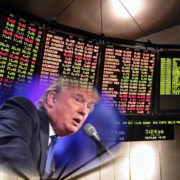IS IT TIME TO INCREASE INTERNATIONAL EXPOSURE IN YOUR PORTFOLIO?
As the U.S. stock market ( as measured by the S&P 500) continues on its almost daily march to new highs, investors need to remember that nothing goes up in a straight line forever, and they should start thinking about investing in markets that may provide more value. It’s also important to note that earnings for large U.S. corporations have been less than stellar, GDP for the first quarter came in at a paltry 0.1% and the labor participation rate is the lowest since the Carter presidency. While I am not predicting a market crash, I do think that there may be better investment opportunities outside of the U.S. Keep in mind the most important investing mantra; buy low and sell high. It’s no secret to readers of this column that for the long-term I am a huge fan of investing in international and emerging market stocks.
Europe
I am not overly optimistic about Europe’s long-term economic future, but when it comes to investing, emotions need to be put to the side and if an interesting opportunity arises, it needs to be researched. Gary Gordon, president of Pacific Park Financial, writes, “Consider the circumstances in Europe. The Russia-Ukraine conflict remains a consistent source of uneasiness. Europe’s economy struggles to expand. Meanwhile, corporate profits have underachieved as the common currency for the eurozone remains stubbornly high. On the other hand, the European Central Bank (ECB) has strongly indicated a bias toward easing interest rates in June. Not only is this likely to depreciate the euro-dollar and benefit the exports of major corporations, but central bank stimulus remains one of the biggest reasons for investor appetite in risk assets. Not sure if ECB stimulus is all that important? Ever since ECB head Mario Draghi began hinting about taking action a few months ago, the relative strength of European stocks compared to U.S. stocks surged.”
Tiger’s roar
While Europe presents a medium term opportunity, for investors with a longer-term horizon the Far East is where it’s at. As I write in my book Retirement GPS: How to Navigate Your Way to A Secure Financial Future with Global Investing “The OECD reports that over the next twenty years the middle-class in the North America is set to drop by both numbers of people and as a percent of the global middle class. The situation in Europe is much worse; its share of global middle class is expected to drop from 36% in 2009 to just 14% in 2030. Contrast that to Asia and the rest of the world where you see explosive growth in the middle class, and you can clearly see that most of us will be living part of our retirement years during a major economic leadership change.”
According to JP Morgan Asset Management, “Looking at history as a guide, evidence is compelling that an investment into AsiaPacific at current valuations is merited. Asia’s valuations are at a significant discount relative to the developed world and relative to history.”
I am usually not a huge believer in trying to time markets, but Asian markets are cheap relative to the U.S. and with the longer-term economic trends firmly at play, now seems like a potentially good time to invest. Investors need to do their own research to make sure this type of investment fits their risk profile.
Retirement income
If you are a retiree looking for income, these markets can be a good solution. Stocks in these markets provide significantly higher dividends on average than US stocks. Even when comparing small-cap stocks (not usually associated with high dividends) U.S. small caps have about a 1% yield and international and emerging market small caps sport a more attractive near 4% yield.
There is certainly risk with investing in international and emerging markets and over the short-term they can be volatile, but speak with your financial professional to investigate whether there is room in your portfolio for increased international exposure.
The information contained in this article reflects the opinion of the author and not necessarily the opinion of Portfolio Resources Group, Inc. or its affiliates.
Aaron Katsman is author of the book Retirement GPS: How to Navigate Your Way to A Secure Financial Future with Global Investing (McGraw-Hill), and is a licensed financial professional both in the United States and Israel, and helps people who open investment accounts in the United States. Securities are offered through Portfolio Resources Group, Inc. (www.prginc.net). Member FINRA, SIPC, MSRB, SIFMA. For more information, visit www.aaronkatsman.com or email aaron@lighthousecapital.co.il








